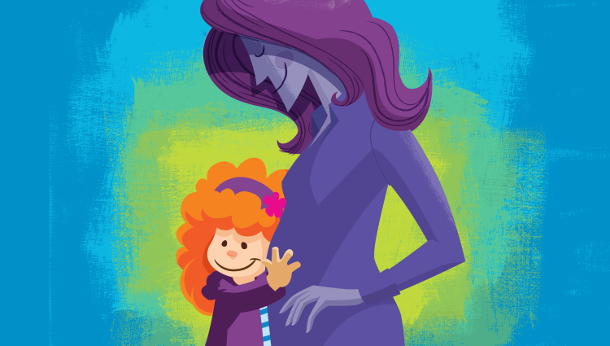Imagine you're a precocious five-year-old with an insatiable curiosity about the world around you.
Every day brings a barrage of questions for your parents, like: "Why can't I fly like a bird?"
"Do fish sleep?"
"Where do babies come from?"
In many families, this last query is met with a nervous glance, cleared throat or unsatisfying mumble about birds and bees. But for curious kids and uncomfortable parents of the 21st century -- you guessed it -- there's an app.
Clementine Wants to Know: Where Do Babies Come From? is the latest project from Puddle Tap Publishing, a B.C.-based app developer aiming to combine the interactivity of games, the narrative of books, and the art of high-quality animated TV into educational media for kids.
The idea for a reproduction app came to Puddle Tap founder and creative director Edouard Sitbon three years ago after realizing he'd left "the talk" with his kids a bit late.
"You reach a point where it becomes -- for them and for the parents -- a little awkward," he said.
On advice from Meg Hickling, a registered nurse and sex educator who acted as content consultant for Clementine, Puddle Tap aimed the app at the primary school market. Sitbon says the sooner kids start talking about sex, the more natural it becomes later in life.
But addressing society's squeamishness about sex, especially when it comes to kids, is an uphill battle. Sitbon found out the hard way when Apple gave the app a 12+ rating last fall, placing Clementine Wants To Know outside the 5+ educational categories it was designed for.
Kids want to know
The app introduces kids to Clementine, a six year-old girl who just found out a new baby brother is on the way.
Excited but also concerned about her ongoing place in her parents' hearts, Clementine peppers her friend, "super camera" Zoom Zoom, with questions: What does it mean to be a big sister? Will her parents still love her when the baby arrives? And where do babies come from anyway?
Thanks to his interactive features, like X-ray vision, fast-forward, rewind, and zooming in and out, Zoom Zoom helps Clementine and app users find all the answers, rewarding them with merit badges for the (age appropriate) tasks they fulfill along the way.
It even touches on surrogate pregnancies, in-vitro fertilization, and adoption, teaching kids about same sex parenting in the process to break up some of the hetero-normativity of reproduction lessons.
Illustrated by John Skewes of the Larry Gets Lost children's series, Clementine Wants to Know is the first in what Puddle Tap creators hope will be a series of science education apps for kids.
Sex ed 2.0
Though the interactive presentation is new, Jay Eidelman, PuddleTap's co-founder and director of business development, says Clementine's depictions of reproductions are similar to educational texts from the 1970s. The app also covers much of the same content the newly revamped Ontario sex ed curriculum does, including the scientific names for genitals and how a fetus develops.
What sets the app apart is learning aids, like rewards for completing tasks like helping the sperm reach the egg, says Sitbon. "[Kids] remember information more and they get a much deeper understanding," he said -- an argument that some research on kids and apps bears out.
But even focusing on the science of sex may be no match for some parents' discomfort. As the recent public uproar over Ontario's sex ed revisions showed, fears that teaching primary schoolers anything about sex could destroy their innocence runs deep.
B.C.-based sex educator Saleema Noon says it's a common but unfounded concern.
"We know from research that it's not information that leads to early sexual experimentation, it's a lack of it, it's curiosity," she said. "We give boundaries around this information. We tell kids, 'sex isn't for kids. It's only for grownups.'"
If parents opt to say nothing to their kids about sex, Noon adds, then someone else will.
"We want our kids to have accurate information from a reliable source," she said, "rather than blindly believing what they hear from kids on the playground, or older brothers and sisters, or the internet."
Noon, who refers to app-consultant Hickling as her mentor, recommends Clementine to parents she meets. Endorsements from sex educators is one of the ways Puddle Tap is working around the Apple rating system to get the product out to appropriate age groups.
"We understand where Apple's coming from, it is a sensitive subject. Some would even say it's a controversial subject," said Eidelman.
Clementine's creators maintain parents and kids should use the app together, sparking age-appropriate conversations that normalize sex.
The more comfortable young kids are talking about how babies are made, Eidelman says, the more likely they'll come to their parents with questions about more controversial issues like sexuality and consent when they're older.
"Any tool that lets parents and kids feel more comfortable discussing the topic is going to help them in their development," he said. ![]()
Read more: Education, Gender + Sexuality
















Tyee Commenting Guidelines
Comments that violate guidelines risk being deleted, and violations may result in a temporary or permanent user ban. Maintain the spirit of good conversation to stay in the discussion.
*Please note The Tyee is not a forum for spreading misinformation about COVID-19, denying its existence or minimizing its risk to public health.
Do:
Do not: